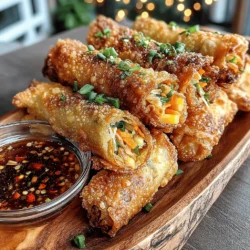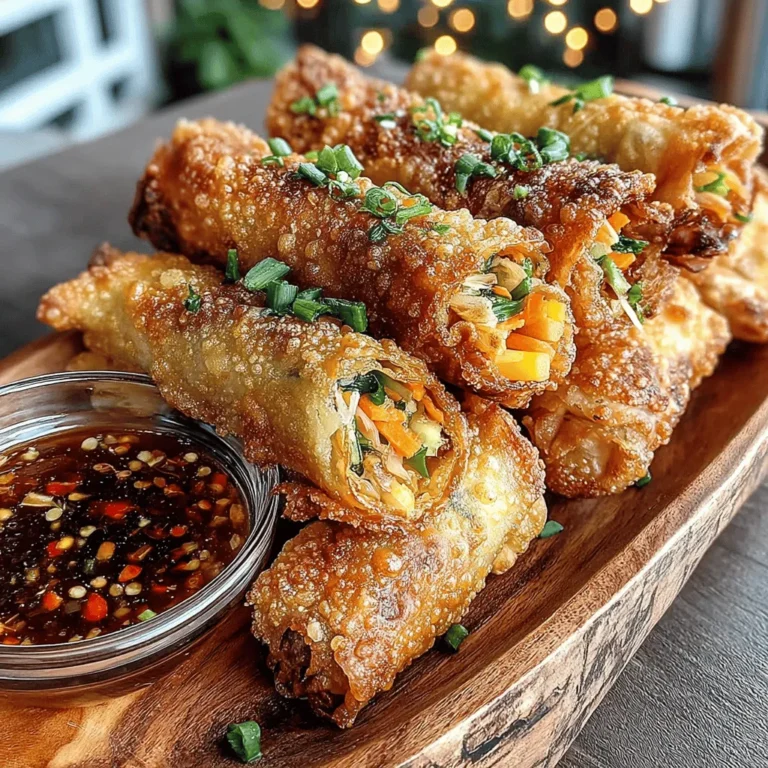Introduction
The culinary landscape of the Philippines is rich and diverse, with an array of flavors that tantalize the taste buds. One dish that stands out for its delightful crunch and flavorful filling is Crispy Filipino Lumpia. This beloved snack, often enjoyed at gatherings and celebrations, is a perfect blend of ground meat and fresh vegetables, wrapped in a thin pastry and served with a sweet chili sauce. The experience of biting into a crispy lumpia, revealing a medley of savory ingredients, is a testament to the Philippines’ vibrant food culture.
As we embark on this culinary journey, we will explore the origins of lumpia, delve into the essential ingredients that bring this dish to life, and outline the initial steps required to craft these crispy delights. Whether you are a seasoned cook or a newcomer to Filipino cuisine, this guide will provide you with the knowledge and confidence to create your own batch of lumpia at home.
Understanding Lumpia: A Filipino Culinary Treasure
Exploring the Origins of Lumpia
Lumpia traces its roots back to the Chinese spring roll, introduced to the Philippines during the 9th century through trade. Over the centuries, this dish has evolved, adapting to local ingredients and tastes, making it a truly Filipino favorite. Each region of the Philippines boasts its own variation of lumpia, reflecting the local culture and culinary traditions. For instance, Lumpiang Shanghai is a popular version filled with ground pork, while Lumpiang Sariwa features a fresh vegetable filling wrapped in a soft crepe. This adaptability has solidified lumpia’s status as a staple in Filipino cuisine, especially during festive occasions such as birthdays, weddings, and holidays.
The Appeal of Lumpia
What makes lumpia particularly appealing is its versatility. This dish can be filled with a variety of ingredients, catering to different dietary preferences. Traditional filling options include ground pork, chicken, shrimp, and a colorful array of vegetables like carrots, green beans, and cabbage. For those seeking vegetarian options, lumpia can be easily adapted with tofu and an assortment of vegetables. This flexibility allows lumpia to be a crowd-pleaser at any gathering, showcasing the ability to cater to diverse palates.
Moreover, the process of making lumpia is often a communal activity, bringing families and friends together in the kitchen. Wrapping the lumpia can be a fun and engaging task, allowing everyone to participate and share their own culinary tips. Whether you’re preparing for a festive celebration or simply looking for a delicious snack, crispy lumpia is a delightful choice that embodies the spirit of Filipino hospitality.
Ingredients: The Building Blocks of Flavor
To create the perfect crispy lumpia, selecting the right ingredients is crucial. Here’s a breakdown of the essential components that will elevate your dish:
Essential Ingredients for the Lumpia
– Ground Pork or Chicken: The choice of meat is fundamental in determining the flavor profile of your lumpia. Ground pork is the traditional choice, providing a rich and savory base. However, ground chicken can be a lighter alternative, catering to those who prefer a leaner option.
– Fresh Vegetables: The inclusion of fresh vegetables not only adds texture but also enhances the nutritional value of the dish. Carrots, finely chopped green beans, and bean sprouts are commonly used, providing a satisfying crunch and vibrant color.
– Seasonings: The right blend of seasonings is essential to infuse the filling with flavor. Soy sauce, oyster sauce, and a dash of black pepper are commonly used to enhance the taste of the meat and vegetables. These ingredients work harmoniously to create a savory filling that complements the crispiness of the wrapper.
Crafting the Perfect Sweet Chili Sauce
No lumpia experience is complete without a delicious dipping sauce. The sweet chili sauce, with its balance of sweetness and heat, perfectly complements the crispy texture of the lumpia. Key ingredients typically include sugar, vinegar, garlic, and red chili flakes.
– Flavor Profiles: The sweetness from the sugar balances the tanginess of the vinegar, while the garlic adds depth and aroma. Adjusting the spice levels is simple—add more chili flakes for a bit of heat or reduce them for a milder sauce.
Next, let’s dive into the step-by-step instructions for making crispy lumpia, starting with the preparation of the filling.
Step-by-Step Instructions for Making Crispy Lumpia
Preparing the Filling
1. Gather Your Ingredients: Begin by assembling all the necessary ingredients for your lumpia filling. This includes your choice of ground meat, fresh vegetables, and seasonings.
2. Cook the Meat: In a large skillet over medium heat, add a bit of oil and sauté the ground pork or chicken until it is fully cooked. Break up the meat with a spatula to achieve an even consistency.
3. Add the Vegetables: Once the meat is browned, add finely chopped carrots, green beans, and bean sprouts to the skillet. Stir-fry the mixture for a few minutes until the vegetables are tender yet still crisp.
4. Season the Mixture: Pour in soy sauce and oyster sauce, stirring to combine evenly. Season with black pepper to taste. Allow the filling to cook for an additional minute or two to marry the flavors, then remove it from heat.
5. Cool the Filling: Transfer the mixture to a bowl and let it cool. It’s important to allow the filling to cool to room temperature to prevent the lumpia wrappers from becoming soggy during the wrapping process.
With the filling prepared, you are now ready to wrap the lumpia. In the next section, we will guide you through the wrapping technique and the frying process to achieve that irresistible crispy texture.
{{image_2}}
Detailed Instructions on Mixing Meat and Vegetables
To create the filling for your lumpia, start by preparing the ingredients. Use a large mixing bowl to combine the ground pork (or chicken), finely chopped vegetables, and seasonings. The classic combination of carrots, green beans, and cabbage works beautifully, but feel free to add mushrooms or bell peppers for additional flavor and texture.
1. Combine Ingredients: In the mixing bowl, add 1 pound of ground meat, 1 cup of finely chopped carrots, 1 cup of finely chopped cabbage, and 1 cup of finely chopped green beans. You can also include 1/2 cup of diced onions and 3 cloves of minced garlic for added depth.
2. Season: Add salt and pepper to taste, along with a tablespoon of soy sauce, and a teaspoon of sesame oil. These ingredients will enhance the flavor balance of your filling.
3. Mix Thoroughly: With clean hands, mix the ingredients until everything is evenly distributed. Ensure the mixture is not too wet; if it feels soggy, you can add a tablespoon of cornstarch to help bind the filling.
Wrapping the Lumpia
Visualizing the Wrapping Technique for Perfect Presentation
The wrapping technique is crucial for achieving both a beautiful presentation and ensuring that the filling remains intact while frying. Here’s how to wrap your lumpia:
1. Prepare Wrappers: Lay out the lumpia wrappers on a clean, flat surface. Keep the wrappers covered with a damp cloth to prevent them from drying out.
2. Filling: Place a tablespoon of the meat and vegetable mixture near the edge of the wrapper closest to you, forming a log shape.
3. Roll and Tuck: Fold the edge of the wrapper over the filling, tucking it in tightly. Then, fold in the sides while continuing to roll tightly forward. Use a bit of water to seal the top edge of the wrapper.
Common Mistakes to Avoid When Wrapping
– Overfilling: Avoid the temptation to overfill your lumpia. A tablespoon of filling is usually enough. Overfilling can cause the wrappers to break during frying.
– Sealing Issues: Make sure to seal the edges properly with water; otherwise, the filling may leak out during cooking.
– Dry Wrappers: Ensure the wrappers are moist and not dried out, as dry wrappers can crack and spoil the final presentation.
Making the Sweet Chili Sauce
Cooking Techniques for Achieving the Right Consistency
Sweet chili sauce is the perfect complement to your crispy lumpia, offering a delightful contrast to the savory filling. Here’s how to make it:
1. Combine Ingredients: In a small saucepan, combine 1 cup of water, 1/2 cup of sugar, 1/2 cup of rice vinegar, and 2 tablespoons of chili flakes.
2. Thicken the Sauce: Bring the mixture to a boil over medium heat. Once boiling, reduce the heat and let it simmer. To thicken the sauce, mix 1 tablespoon of cornstarch with 2 tablespoons of cold water to create a slurry, then gradually stir it into the simmering sauce.
3. Flavor Enhancement Options: For added depth, consider incorporating minced garlic (about 1 clove), a dash of soy sauce, or even a squeeze of lime juice into the sauce. Adjust sweetness and spice levels to your taste.
4. Simmer: Allow the sauce to simmer for about 5–10 minutes until it reaches a syrupy consistency. Remove from heat and let cool before serving.
Frying the Lumpia
Best Practices for Frying, Including Oil Temperature and Cooking Time
Frying your lumpia is where the magic happens. Follow these guidelines to achieve that perfect crispy texture:
1. Preheat the Oil: In a deep pan or wok, heat about 2 inches of vegetable oil over medium-high heat. To test if the oil is ready, drop a small piece of wrapper into the oil; if it sizzles immediately, the oil is hot enough.
2. Fry in Batches: Carefully add the wrapped lumpia to the hot oil, ensuring not to overcrowd the pan. Fry in batches of 6-8, depending on the size of your pan.
3. Cooking Time: Fry for about 3-5 minutes on each side, turning occasionally until golden brown. The lumpia should be crispy and evenly colored.
How to Achieve That Perfect Golden-Brown Color
To achieve that coveted golden-brown color, keep the following in mind:
– Temperature Control: If the oil is too hot, the lumpia may burn before cooking through. If it’s too cool, they will absorb too much oil and become greasy. Maintain a steady medium-high heat.
– Drain Properly: Once golden brown, remove the lumpia from the oil and place them on a plate lined with paper towels to absorb excess oil.
Serving Suggestions and Pairings
Presenting Your Crispy Lumpia
Presentation can elevate your dish from good to great. Here are some tips for plating your lumpia attractively:
1. Plating: Arrange the crispy lumpia on a platter. Consider placing them in a fan shape or stacked vertically for a dynamic look.
2. Garnishing Ideas: Sprinkle chopped green onions, sesame seeds, or fresh cilantro on top for an attractive finish. A small bowl of sweet chili sauce should be included for dipping.
Complementary Dishes and Drinks
To enhance the lumpia experience, consider pairing them with traditional Filipino dishes and beverages:
– Rice Dishes: Serve your lumpia alongside steamed jasmine rice or a flavorful fried rice dish for a complete meal.
– Salads: A simple side salad with a tangy vinaigrette can balance the richness of the lumpia.
– Traditional Drinks: Pair your meal with refreshing traditional drinks like mango juice or a cool glass of calamansi juice. These fruity beverages will complement the savory flavors of the lumpia beautifully.
Conclusion
Crispy Filipino Lumpia with Sweet Chili Sauce is more than just a dish; it is a celebration of flavors and textures that embodies the warmth of Filipino hospitality. With its crunchy exterior and savory filling, this appetizer is sure to impress at any gathering. By following the steps outlined above, you can bring a piece of the Philippines into your kitchen, creating not just a meal but a delightful experience shared with friends and family. Enjoy the process of making lumpia, and savor the joy it brings to your table.


